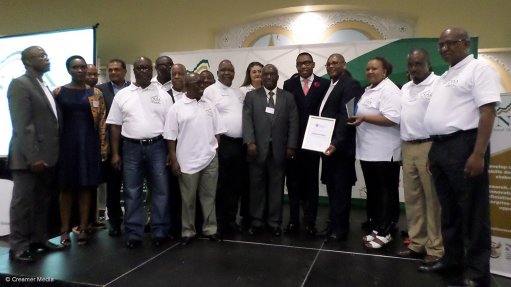
The new National Skills Authority board
The National Skills Authority (NSA) would renew efforts to strengthen skills development to ensure a responsive post-school education and training sector in South Africa, acting chairperson Thulani Tshefuta stressed on Thursday.
Speaking at the announcement of the authority’s newly elected board members, in Midrand, he encouraged all NSA stakeholders to provide solutions to assist with skills development and education and training in the country.
The board members were nominated by organised business, labour and community members through the National Economic Development and Labour Council process.
The State, public institutions of learning and private skills development providers, employment agencies, the South African Qualifications Authority, the Quality Council for Trades and Occupations and skills experts also constitute the NSA.
The White Paper for Post-School Education and Training provided the NSA with a mandate to concentrate specifically on monitoring and evaluating South Africa’s 21 sector education and training authorities (Setas).
Tshefuta pointed out that there were Setas that had achieved “extraordinary results”, but also acknowledged that there were some that had been “a disgrace to the education system”.
“We must, therefore, promote initiatives for Setas to share lessons among themselves. This is one of the key goals the new board of the NSA seeks to achieve,” he added.
He noted that the new board had already advised Higher Education and Training Minister Dr Blade Nzimande to extend the National Skills Development Strategy III (NSDS III) by two years beyond its March 2016 expiry date, which he accepted and implemented.
The NSDS III is the overarching strategic guide for skills development and provides direction to sector skills planning and implementation in the Setas. It provides a framework for the use of skills development levies, as well the National Skills Fund, by these institutions and sets out the linkages with, and responsibilities of, other education and training stakeholders.
The strategy is informed and guided by other interlinking government programmes, such as the Human Resource Development Strategy for South Africa, the requirements of the New Growth Path, the Industrial Policy Action Plan, the outcomes of the Medium-Term Strategic Framework, the rural development strategy, as well as the new environment strategy. It also seeks to enable a closer synergy between the world of work and the formal education system in South Africa.
Higher Education and Training Deputy Minister Mduduzi Manana, meanwhile, emphasised the importance of Setas, stating that “they addressed the shortage of skills in the workplace”.
“Therefore, it is incumbent upon the NSA and the Department of Higher Education and Training to build a supporting system for an effective Seta system,” he said.